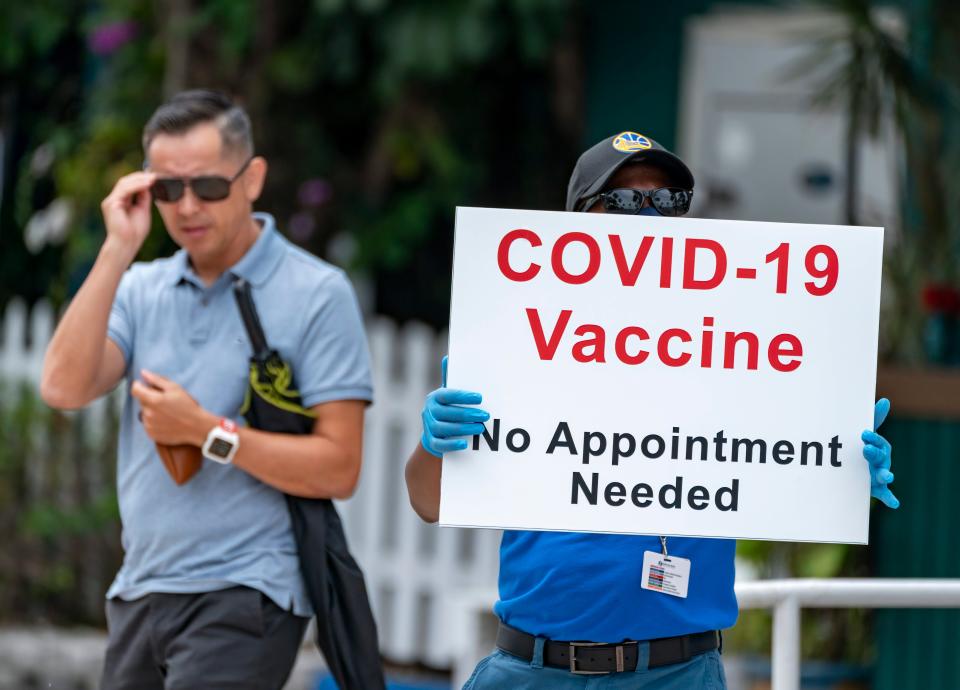The vaccinated are angry. That's understandable but unproductive, health experts say
- Oops!Something went wrong.Please try again later.
Masks are back, some hospitals are filling up again and there's little question who is causing the latest resurgence of COVID-19 in the USA.
Unvaccinated Americans are rapidly becoming sick from the ultra-contagious delta variant, and they often get extremely ill: More than 97% of people hospitalized for COVID-19 in mid-July were unvaccinated, said Dr. Rochelle Walensky, director of the Centers for Disease Control and Prevention.
It's a tragically predictable outcome, leading some politicians and pundits to unload their frustrations on the unvaccinated.
"It’s not a pandemic of ignorance," the Santa Monica Daily Press quipped in an editorial about Los Angeles County's spike in cases and hospitalizations. "This is a surge of straight stupidity."
High levels of infections in unvaccinated people increase the risk to everyone, and headline after headline has documented the ensuing rage of the vaccinated. Unvaccinated Americans have been called "arrogant," "selfish" "stupid," "idiots" and worse for refusing to get the jab.
Anthony Fauci to USA TODAY Editorial Board: Expect 'a flood' of COVID-19 vaccine mandates after full FDA approval
Public health experts told USA TODAY that anger is understandable, widespread and unproductive. They worry that shaming and blaming the unvaccinated could backfire – entrenching their decision rather than persuading them to get the shots.
The only way to end the death and suffering of COVID-19 is to get millions of Americans vaccinated. Mandates may help, but insults, anger and dismissiveness are widely considered a terrible way to convince people to get vaccinated.
"If you’re going to call me an idiot … that isn’t encouragement,” Stephanie McClure, an assistant professor of biocultural medical anthropology at the University of Alabama, told USA TODAY. “You usually don’t get anywhere by attacking people.”
Shaming and insulting people is "not a very effective way to promote adoption of a behavior,” said McClure, who leads the Tuscaloosa, Alabama, team for CommuniVax, a national alliance advocating for historically underserved Black, Indigenous and Latino populations amid the COVID-19 pandemic.

As a primary care doctor who sees patients daily, Marlene Millen shares the exhaustion of the vaccinated as cases rise: "I’m tired, I’m burnt out ... lately I’ve gotten to the end of my rope.”
But her experience has taught her that pointing fingers doesn't help. Millen, a professor of medicine at the University of California, San Diego, doesn't like the "pandemic of the unvaccinated" moniker used by federal health authorities for that reason – it creates a gulf between vaccinated and unvaccinated.
Gleb Tsipursky, who holds a Ph.D. in the history of behavioral science, similarly doesn't like the term: "You’re fixing them into these groups," he said. Tsipursky is CEO of Disaster Avoidance Experts and authored wrote a book about the risks of returning to the office amid a pandemic.
The Backstory: My brother is one of millions who won't get a COVID-19 vaccine. I asked why. Here are his reasons, my responses.
Though some Americans are actively anti-vaccine, many who haven't gotten the shots are held back by factors that can be addressed, Dr. Ashish Jha, dean of Brown University's School of Public Health, told USA TODAY.
McClure wrote in an editorial in The Daily News in Newburyport, Massachusetts, that the term "vaccine hesitancy" can lump together the complex reasons some people have not gotten vaccinated. She said many are afraid, misinformed or mistrustful of authorities.
McClure's conversations with unvaccinated people have revealed some have misperceptions that can be corrected – if someone takes the time to listen. Some unvaccinated people worry about side effects; others fear breakthrough infections; others struggle with health care literacy.
African Americans have been disproportionally affected by the pandemic and know the U.S. health care system does not treat them equally, McClure said. That fuels mistrust, and insults are "not going to motivate you to think differently."
She worries the frustration she sees among the vaccinated could be a precursor to dismissiveness: “We might as well not try.”And “then people just stay in their camps."
'The best decision': Amid climbing COVID-19 cases and community efforts, racial disparity in vaccinations appears to be narrowing
Tsipursky said all major demographics of unvaccinated people don't respond well to authorities telling them what to do.
Blame and insults are particularly counterproductive when dealing with people who may see the vaccine as a political issue, he said. That tone creates a defensive response in which they are likely “lash out against authority” – even if it puts them at a greater risk.
Tsipursky said he prefers positive language: Vaccinated people are doing their civic duty; they're patriots; they're protecting their families.
Millen said family members can make a big difference. It's especially effective to limit in-person gatherings with unvaccinated family until they get the shots, she said.
She hopes Americans will have patience with one another, especially amid the deluge of news about the delta variant.
“I have a medical degree … and I’m having trouble keeping up,” she said.
She doesn't want a simple message to get lost in that noise: “The vaccines are working to prevent hospitalizations.” And vaccinated people still have a role to play: following the CDC's guidance about masking up again as scientists work to better understand how this latest iteration of the virus spreads.
Contributing: Daniel Funke
This article originally appeared on USA TODAY: Vaccinated, angry: Experts say insults won't motivate the unvaccinated

